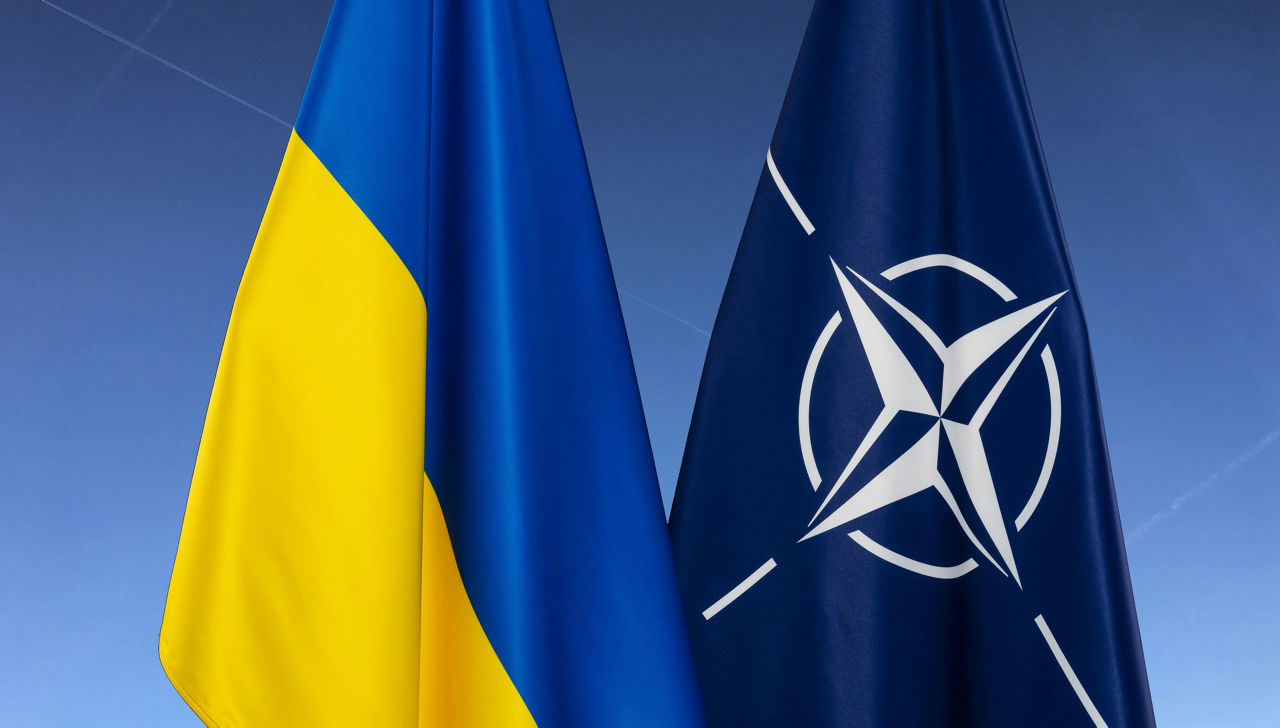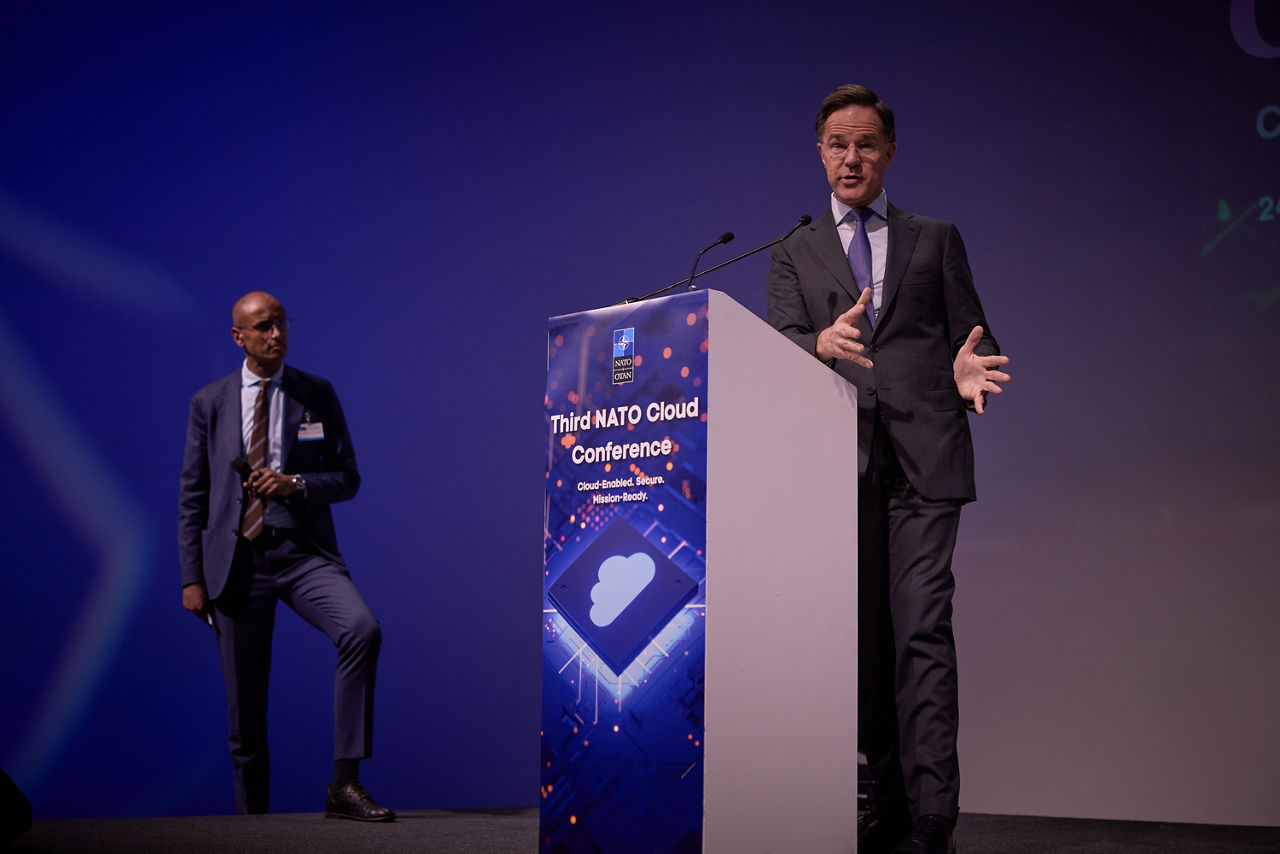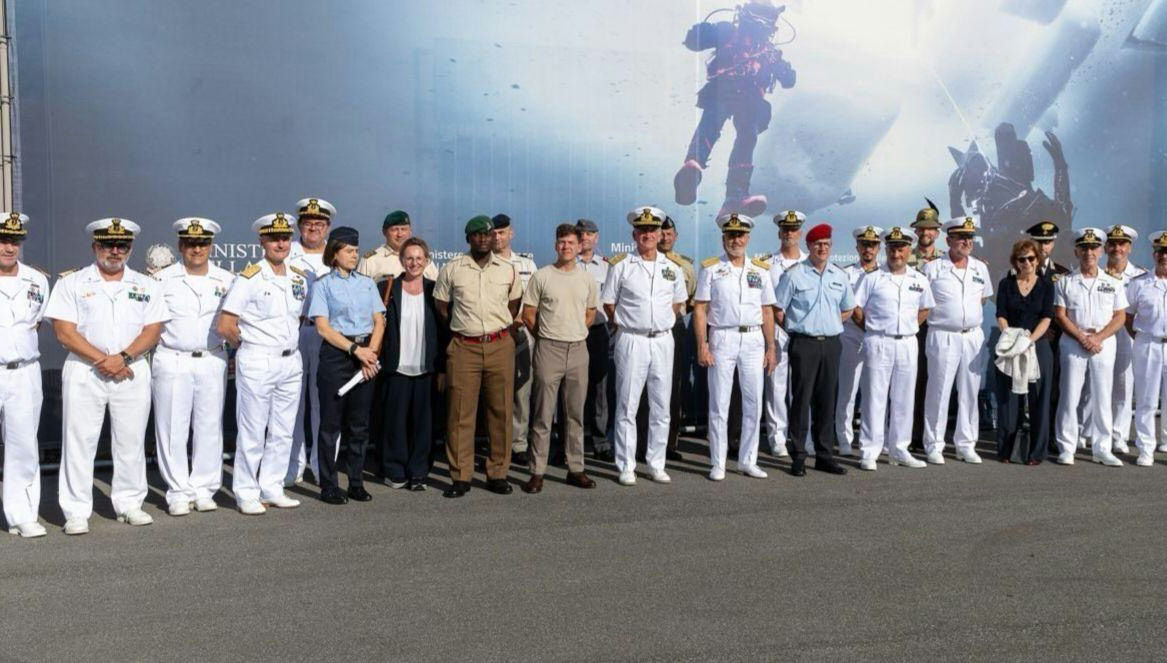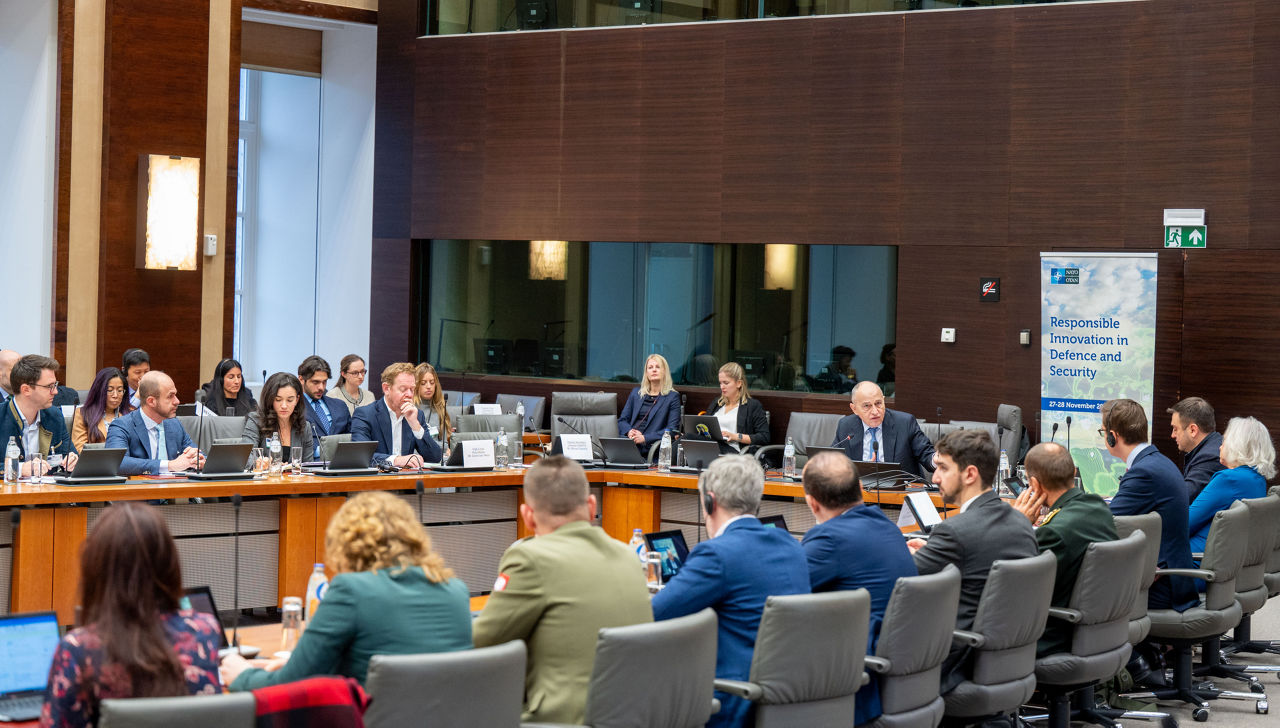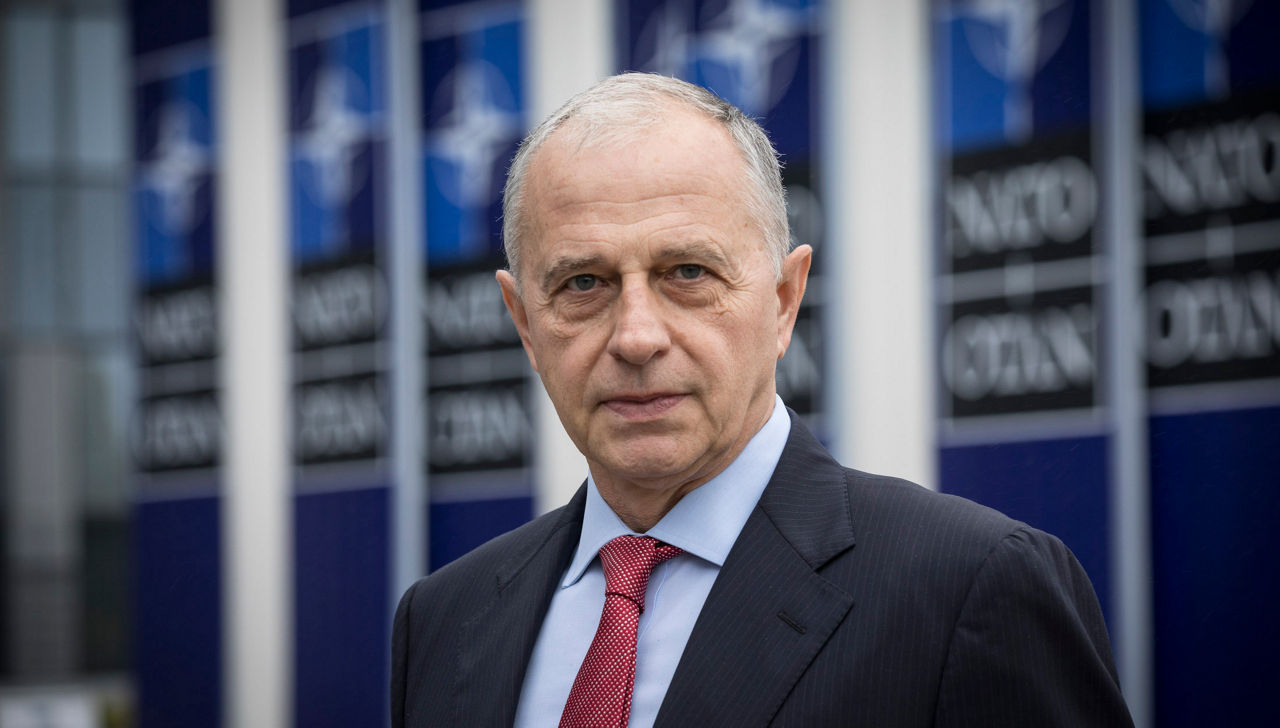Download NATO’s broadcast-quality video content free of charge

Log in
NATO MULTIMEDIA ACCOUNT
Access NATO’s broadcast-quality video content free of charge

Check your inbox and enter verification code
You have successfully created your account
From now on you can download videos from our website
Subscribe to our newsletter
If you would also like to subscribe to the newsletter and receive our latest updates, click on the button below.
Enter the email address you registered with and we will send you a code to reset your password.
Didn't receive a code? Send new Code
The password must be at least 12 characters long, no spaces, include upper/lowercase letters, numbers and symbols.
Your password has been updated
Click the button to return to the page you were on and log in with your new password.
Emerging and disruptive technologies
Updated: 25 June 2025
Technologies such as artificial intelligence (AI), autonomous systems and quantum technologies are changing the world and the way NATO operates. These and other emerging and disruptive technologies (EDTs) present both risks and opportunities for NATO and Allies. That’s why the Alliance is working with public and private sector partners, academia and civil society to develop and adopt new technologies, establish international principles of responsible use, and maintain NATO’s technological edge through innovation.
- Since its creation, NATO has stayed at the forefront of technology to ensure the defence of its member countries and the success of its operations.
- In recent years, NATO Allies have worked together to establish an overarching strategy on emerging and disruptive technologies. This strategy is helping to ensure that Allies are fostering the development and adoption of new technologies, while at the same time protecting themselves from the use of EDTs by potential adversaries and competitors.
- NATO is also developing more detailed policies and implementation plans focused on specific technological domains. Currently, this includes artificial intelligence (AI), autonomous systems, quantum technologies, biotechnology and human enhancement technologies, space, hypersonic systems, novel materials and manufacturing, energy and propulsion, and next-generation communications networks.
- Allies are substantially accelerating the pace of adoption of new technological products to help address NATO’s capability targets and increase the production capacity of Allied defence innovation ecosystems.
- To that end, NATO Allies have established new initiatives to support technological innovation throughout the Alliance, including the Defence Innovation Accelerator for the North Atlantic (DIANA) and the EUR 1 billion NATO Innovation Fund, the world’s first multi-sovereign venture capital fund.
- NATO is engaging with other international organisations, including the European Union (EU) and the United Nations (UN), to address emerging and disruptive technologies.
The strategic context – Why does NATO care about EDTs?
Emerging and disruptive technologies are increasingly touching all aspects of life – from electronics like phones and computers, to everyday activities like grocery shopping and banking. These technologies are also having a profound impact on security. Innovative technologies are providing new opportunities for NATO militaries, helping them become more effective, resilient, cost-efficient and sustainable as well as address immediate capability shortfalls and deliver on their capability targets. These technologies, however, also represent new threats from state and non-state actors, both militarily and to civilian society.
NATO’s 2022 Strategic Concept - which defines key challenges facing the Alliance and outlines how NATO will address them - reflects this changing context. It affirms that EDTs bring both opportunities and risks, and that they are altering the character of conflict, acquiring greater strategic importance and becoming key arenas of global competition. As a result, Allies agreed in the Strategic Concept to promote innovation and increase investments in EDTs to retain NATO’s interoperability and military edge. Allies will work together to adopt and integrate new technologies, cooperate with the private sector, protect their innovation ecosystems, shape standards and commit to principles of responsible use that reflect the Alliance’s democratic values and human rights.
To embrace these opportunities while also countering threats enabled by EDTs, NATO has worked with Allies to, develop responsible, innovative and agile EDT policies, and is now helping Allies to accelerate the adoption and integration of new technological products. By working more closely with relevant partners in academia and the private sector, NATO aims to maintain its technological edge and military superiority, helping deter aggression and defend Allied countries.
Innovation policy – What is NATO’s EDT strategy?
In February 2021, NATO Defence Ministers endorsed “Foster and Protect: NATO’s Coherent Implementation Strategy on Emerging and Disruptive Technologies.” This is NATO’s overarching strategy to guide its relationship to EDTs. It has two main areas of focus:
- fostering a coherent approach to the development and adoption of dual-use technologies (i.e., technologies that are focused on commercial markets and uses but also have defence and security applications) that will strengthen the Alliance’s technological edge, and
- creating a forum for Allies to help protect themselves from the use of EDTs by hostile actors, and protect their own EDTs and innovation ecosystems from interference and manipulation by potential adversaries and competitors.
These goals are key to ensuring NATO retains its strategic and effective dominance.
NATO’s innovation activities currently focus on nine priority technology areas:
- artificial intelligence (AI)
- autonomous systems
- quantum technologies
- biotechnology and human enhancement technologies
- space
- hypersonic systems
- novel materials and manufacturing
- energy and propulsion
- next-generation communications networks
The Alliance is developing specific plans for each of these key technology areas (linked above, where a public version is available). These strategies are laying the groundwork for NATO to accelerate responsible innovation and the rapid adoption of modern technologies, in order to improve decision-making and steer transatlantic innovation for defence and security in accordance with Allied values, norms and international law.
Data is a key enabler for all EDTs. NATO is bolstering its data exploitation efforts through its Framework Policy and Strategic Plan. In line with the Strategic Concept’s call to expedite the digital transformation of the Alliance, NATO has also developed an Implementation Strategy for Digital Transformation.
NATO’s Rapid Adoption Action Plan
Recognising the strategic importance of keeping up with the rate of technological change outside the Alliance, Allied Leaders endorsed NATO’s Rapid Adoption Action Plan at the 2025 NATO Summit in The Hague. The Plan aims to significantly accelerate the pace at which the Alliance adopts new technological products and integrates them into Allied armed forces, within a maximum of 24 months. It provides Allies with shared objectives and best practices to improve adoption procedures, commit resources and accept risk, underpinned by NATO support. It will help Allies:
- accelerate their national processes for procuring and integrating new technologies into their armed forces at the speed of relevance,
- test emerging technologies and de-risk investment into new products by creating NATO standards of approval that build trust, and
- ensure that defence industry and innovation stakeholders understand NATO’s defence priorities and align their activities with the military needs of the Alliance as a whole.
Innovation in practice – How does NATO accelerate the pace of technology development and adoption?
To meet the critical challenges of today and tomorrow, NATO directly engages innovator communities. Through new initiatives and bodies designed to foster innovation in EDTs and protect such efforts from potential adversaries and competitors, NATO plays an active role in cultivating and growing a transatlantic innovation ecosystem able to support the Alliance’s defence and security.
Defence Innovation Accelerator for the North Atlantic (DIANA)
At the 2021 Brussels Summit, Allied Leaders agreed to launch the Defence Innovation Accelerator for the North Atlantic (DIANA) to foster transatlantic cooperation on critical technologies, promote interoperability and harness civilian innovation by engaging with academia and the private sector. Subsequently established in 2022, DIANA works directly with leading researchers and entrepreneurs, from early-stage start-ups to more mature companies, to solve critical defence and security challenges through dual-use technologies.
DIANA works by running competitive industry challenges. Each challenge is based on a critical defence and security problem, and asks innovators to develop deep tech, dual-use technologies to help solve it. Innovators that are selected to participate in DIANA’s programmes receive non-dilutive grants (i.e., investment capital that does not require them to give up equity or ownership in their company), and gain access to over 20 accelerator sites and more than 180 test centres in dozens of countries across the Alliance. They also have access to a network of mentors (scientists, engineers, industry experts, end-users and government procurement experts) and a community of trusted investors. Lastly, DIANA offers pathways to market both within NATO as an organisation and with NATO Allies.
NATO Innovation Fund
NATO Leaders also agreed at the 2021 Brussels Summit to establish a NATO Innovation Fund. The EUR 1 billion venture capital fund provides strategic investments in start-ups developing dual-use emerging and disruptive technologies in areas that are critical to Allied security.
Many start-ups working on deep tech struggle to attract sufficient investment because of lengthy time-to-market timelines and the high capital intensity of their research. The NATO Innovation Fund tackles this problem by leveraging its unique position as a patient investor with a 15-year run-time better suited to the extended time horizons necessary for deep-tech start-ups. It focuses on early-stage investments (i.e., pre-seed through Series A and follow-on), providing risk capital directly into these start-ups, while also having the ability to invest in other top-tier deep-tech venture capital funds that align with the Fund’s three strategic objectives:
- to seek out cutting-edge technological solutions that solve the Alliance’s defence and security challenges;
- to bolster deep-tech innovation ecosystems across the Alliance; and
- to support the commercial success of its deep-tech start-up portfolio.
The NATO Innovation Fund is the world’s first multi-sovereign venture capital fund. It includes 24 NATO Allies as Limited Partners: Belgium, Bulgaria, Czechia, Denmark, Estonia, Finland, Germany, Greece, Hungary, Iceland, Italy, Latvia, Lithuania, Luxembourg, the Netherlands, Norway, Poland, Portugal, Romania, Slovakia, Spain, Sweden, Türkiye and the United Kingdom. The Fund is making direct investments into start-ups located in any of the 24 participating Allied countries, as well as indirect investments into deep-tech funds with a transatlantic impact.
The Fund’s main headquarters is in Amsterdam, with regional offices in London and Warsaw.
NATO’s Data and Artificial Intelligence Review Board
NATO’s Data and AI Review Board is the focal point of NATO’s efforts to govern responsible development and use of AI. It does this by helping to operationalise the Principles of Responsible Use of AI that Allies agreed in NATO’s AI Strategy, including by developing a ‘Responsible AI’ certification standard. The Board creates practical Responsible AI toolkits, guides Responsible AI implementation in NATO and supports Allies in their Responsible AI efforts.
Each NATO country has a member that sits on the Board. These members may be drawn from government, academia, the private sector or civil society – they come from diverse backgrounds to ensure NATO’s approach to Responsible AI is multidisciplinary. External experts are also part of the Board’s expert subgroups, which help fulfil the Board’s core functions – including with a focus on Responsible AI tools, standards and knowledge-sharing.
NATO Innovation Board
The NATO Innovation Board is chaired by the Deputy Secretary General and brings together high-level civilian and military leadership from across the Alliance. The purpose of the Board is to look at new ideas from outside of the Organization, provoke discussion, foster adoption of best practices and secure cross-NATO support for changes that will help NATO innovate.
Transatlantic Quantum Community
The Transatlantic Quantum Community (TQC) is an informal and flexible group where NATO Allies share expertise, exchange technical information and coordinate joint action in order to strengthen Allied quantum technology ecosystems. It is not an official committee or formal group within the NATO structure, but it provides a framework for Allies to collaborate on a voluntary basis and advance their national quantum technology agendas in the transatlantic context. All Allies are invited to participate in the Community. Participating Allies nominate a national delegation of four representatives for each meeting, which can include quantum-related experts from national governments, industry, academia, funding bodies and research institutions. The TQC allows for the early detection of trends in quantum technology development, prevents unnecessary duplication of efforts and incentivises the adoption of quantum technologies in more mature development phases. Ultimately, it helps Allies deliver on the aims outlined in NATO’s Quantum Technologies Strategy.
Other NATO innovation bodies
Other NATO bodies that are also involved in the Alliance’s innovation activities and are driving technological development and adoption across NATO include:
- Allied Command Transformation (ACT)
- The Digital Policy Committee (DPC)
- The Conference of National Armaments Directors (CNAD)
- The Science and Technology Organization (STO)
- The Science for Peace and Security Programme (SPS)
- The Centre for Maritime Research and Experimentation (CMRE)
- The NATO Communications and Information Agency (NCIA)
NATO’s focus on EDTs is strongly linked to cooperation with partners in the public and private sector, academia and civil society. Given that many defence applications of EDTs are developed by or with the private sector, engagement with industry – especially start-ups – is key. The North Atlantic Council has held several technology-focused sessions where Permanent Representatives connect with executives driving technological breakthroughs.
NATO-Ukraine Innovation Cooperation Roadmap
Ukraine’s ability to rapidly adopt innovative technologies and integrate them with traditional warfighting is a fundamental pillar of its ability to counter Russia’s conventional military advantages in armour, artillery and manpower, as well as in the cyber and hybrid domains. As the operational importance of EDTs is increasing, so is the potential for mutually beneficial cross-pollination of technological developments and best practices between NATO and Ukraine – which are both in a technological race against potential adversaries and strategic competitors.
The NATO-Ukraine Innovation Cooperation Roadmap defines shared objectives and outlines key workstreams under four delivery areas: innovation policy enablers, innovation ecosystem engagement, pilot activities and lessons learned. It also provides an implementation framework to achieve these objectives in a coherent manner, ensuring interoperability between NATO and Ukraine. The Roadmap focuses both on meeting urgent requirements and ensuring long-term cooperation.
Evolution
NATO has been supporting innovation, both in Allied armed forces and in its own capabilities, since the Alliance was founded. However, the accelerating pace of emerging and disruptive technologies is creating rapid and large-scale changes – not only in everyday life, but also in security and defence. The timeline below lays out milestones in the development of NATO’s EDT policies.
December 2019 – NATO Leaders agree an Emerging and Disruptive Technology Implementation Roadmap with seven original EDT areas: data, AI, autonomy, quantum technologies, biotechnology and human enhancement technologies, hypersonic technologies and space. The purpose of this roadmap is to help structure NATO’s work across key technology areas, and enable Allies to consider the implications of these technologies, for instance for deterrence and defence, and capability development.
December 2019 – NATO Leaders declare space to be a fifth operational domain, alongside air, land, maritime and cyberspace. This follows the adoption of NATO’s overarching Space Policy, which was agreed by Allied Defence Ministers in June 2019.
December 2019 – NATO Leaders ask Secretary General Jens Stoltenberg to lead a forward-looking reflection process to strengthen NATO both militarily and politically and to adopt a more global approach for the Alliance. Over the subsequent months, this takes shape as the NATO 2030 initiative.
June 2020 – Following consultation with Allied parliamentarians, civil society, public and private sector experts, and young leaders, NATO Secretary General Jens Stoltenberg lays out his priorities for NATO 2030. This includes a focus on innovation and critical technologies, to make sure that the Alliance remains ready to face tomorrow’s challenges. DIANA and the NATO Innovation Fund begin to take shape as key pillars of the NATO 2030 agenda.
July 2020 – The Secretary General establishes the first NATO Advisory Group on Emerging and Disruptive Technologies. The group consists of 12 external experts from the private sector and academia, from countries across the Alliance. These experts provide advice to NATO on the adoption of new technologies and other aspects of innovation, including education, financing and innovation ecosystems.
September 2020 – The 2020-2022 NATO Advisory Group on Emerging and Disruptive Technologies presents recommendations to the NATO Innovation Board, including on innovative technologies that NATO should be pursuing as a priority.
February 2021 – NATO Defence Ministers endorse NATO’s Coherent Implementation Strategy on Emerging and Disruptive Technologies, with a focus on the seven EDT areas from the 2019 EDT Implementation Roadmap.
March 2021 – The NATO Advisory Group on Emerging and Disruptive Technologies publishes its first annual report (for the year 2020), providing four key recommendations for NATO: improve technology literacy throughout the Organization; establish a network of Innovation Centres; design and facilitate new financing mechanisms for innovation with private sector entities, both small and large; and create innovation partnership initiatives with external EDT stakeholders from industry and academia.
June 2021 – At the 2021 Brussels Summit, NATO Leaders agree the NATO 2030 agenda to ensure the Alliance can face the challenges of today and tomorrow, including by sharpening NATO’s technological edge. As part of the NATO 2030 agenda, they also agree to launch the Defence Innovation Accelerator for the North Atlantic (DIANA) and to establish the NATO Innovation Fund.
October 2021 – NATO Defence Ministers endorse NATO’s Artificial Intelligence (AI) Strategy, setting out how the Alliance aims to adapt AI to meet operational requirements, and to accelerate and mainstream the secure and trustworthy integration of AI across a range of Alliance capabilities. Ministers also endorse the Data Exploitation Framework Policy. Seventeen Allies sign up to develop the framework for the NATO Innovation Fund, and to establish how it will work in practice.
February 2022 – NATO Defence Ministers endorse the first Annual Report on Innovation and EDTs, defining new activities to enhance NATO’s technological readiness, including by adding two new EDT areas: novel materials and manufacturing, as well as energy and propulsion.
April 2022 – NATO Foreign Ministers endorse the charter for DIANA, which outlines its mission and strategy; legal authorities; financial mechanism; governance; and the regional offices, accelerator sites and test centres that will make up its initial footprint. Foreign Ministers from 21 Allies agree the framework for the NATO Innovation Fund.
April 2022 – The NATO Advisory Group on Emerging and Disruptive Technologies delivers its second annual report (for the year 2021), examining three critical, ongoing work strands aimed at enabling NATO and Allies to adopt new technologies at pace and maintain a technological edge: DIANA, the NATO Innovation Fund and the Human Capital Innovation Policy (which contains recommendations for NATO on how to attract, retain and develop talented employees with technical skills and innovation mindsets).
June 2022 – At the 2022 Madrid Summit, leaders from 22 Allied countries commit to participating in the NATO Innovation Fund. (Finland and Sweden became the 23rd and 24th participating countries following their accessions to NATO in April 2023 and March 2024 respectively.) Separately, NATO Leaders unveil DIANA’s updated initial footprint of test centres and accelerator sites across the Alliance.
October 2022 – NATO Defence Ministers endorse NATO’s Autonomy Implementation Plan and the establishment of NATO’s Data and Artificial Intelligence Review Board. The Data and Artificial Intelligence Review Board serves to operationalise NATO’s Principles of Responsible Use of AI, as set out in NATO’s AI Strategy. The Autonomy Implementation Plan drives a coherent approach to NATO’s autonomy protection and development efforts in line with the Alliance’s norms, values and commitment to international law.
February 2023 – NATO Defence Ministers endorse the second Annual Report on Innovation and EDTs, which outlines NATO’s approach to fostering and protecting EDTs in 2023. The Report adds next-generation communications networks as a new EDT area and determines that data has been sufficiently mainstreamed into NATO lines of effort, including data exploitation and digital transformation, to no longer be considered a standalone EDT area.
February 2023 – NATO’s Data and Artificial Intelligence Review Board (DARB) meets for the first time to start the development of a user-friendly Responsible AI certification standard.
February 2023 – NATO announces plans to establish the Alliance Persistent Surveillance from Space (APSS) initiative to enhance space-based surveillance and intelligence for the Alliance, which will improve situational awareness and decision-making processes.
March 2023 – DIANA opens its first regional office, at the Imperial College London Innovation Hub in London, United Kingdom.
June 2023 – DIANA launches its first three pilot challenge programmes, inviting innovators to apply to its programmes.
July-August 2023 – The NATO Innovation Fund appoints the investment team that will manage the EUR 1 billion venture capital fund, and confirms the participation of 23 NATO Allies as Limited Partners (becoming 24 when Sweden joins the Alliance in March 2024).
November 2023 – Allied Foreign Ministers approve NATO’s Quantum Technologies Strategy.
November 2023 – DIANA announces its first cohort of innovators, having selected 44 companies from over 1,300 applicants to join its accelerator programme.
March 2024 – DIANA doubles the size of its network of accelerator sites and test centres. DIANA’s network will now comprise 23 accelerator sites (up from 11) and 182 test centres (up from 90) in 28 Allied countries, augmenting DIANA’s capacity to support innovators from across the Alliance as they develop their technologies.
April 2024 – NATO Defence Ministers endorse NATO’s Biotechnology and Human Enhancement Technologies Strategy.
July 2024 – At the 2024 Washington Summit, Allied Leaders endorse NATO's revised Artificial Intelligence (AI) strategy, which builds on the AI strategy published in 2021 and takes account of recent advances in AI technologies, such as generative AI and AI-enabled information tools.
July 2024 – The NATO 2024 EDT Annual Report (covering 2023-2024) sets the direction for the Alliance to develop a “NATO Rapid Adoption Action Plan” in time for the 2025 NATO Summit in The Hague.
July 2024 – At a meeting of the NATO-Ukraine Council during the 2024 Washington Summit, NATO and Ukraine launch new joint activities to support Ukraine’s self-defence through the first NATO-Ukraine Innovation Cooperation Roadmap.
June 2025 – At the 2025 NATO Summit in The Hague, Allied Leaders endorse NATO’s Rapid Adoption Action Plan to accelerate the pace at which the Alliance adopts new technologies and increase the production capacity of Allied innovation ecosystems.


